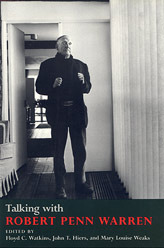Robert Penn Warren (1905-1989) was, in the old expression, a man of parts, a complex intellectual who spent much of his adult life in northern universities, a Kentucky farm boy with the heart and soul of a Confederate gentleman. A founding member of the Agrarian movement of the 1930’s, leader of the so-called Fugitive circle of poets, and guiding light of the New Criticism, he was both culturally conservative and artistically avant-garde. And he was a first-rate thinker and a good talker, as the pages of the delightful collection Talking with Robert Penn Warren reveal in abundance.
Comprising 24 conversations, interviews, and transcribed television appearances, the collection reveals Warren at his plainspoken best. He is generous, bookish, matter-of-fact, occasionally impatient. “I think people can freeze themselves by their hasty intellectualizing of what they are up to,” he remarks, somewhat impatiently, to a too-pompous interlocutor, and goes on to spin out front-porch anecdotes of the writer’s life that shun academic pretense and are all the more attractive for it.
Yet Warren’s homespun talk is perfectly serious, the more so as the years roll by. (The collection is arranged chronologically, and the reader has the chance to see Warren revising himself, his opinions, even the facts of his life from page to page.) He reiterates the concerns of his Agrarian days, drawing on Jeffersonian ideals of the proper relationship of humans to nature and antebellum notions of states’ rights to oppose the rise of the great American technological monoculture (whereby Atlanta, absent its peach trees, looks like any northern or Midwestern burg). He announces his great love for America in idea and fact while steadfastly criticizing its weaker moments, especially the historical oppression of blacks and the conduct of the aimless war in Vietnam.
Radical views, to some, but Warren has more often been unfairly pegged to the reactionary right. Having dared to give politicians a human face and the normal frailties in All the King’s Men, Warren Was exposed to criticism from all manner of leftist orthodoxies. His good-natured, but perfectly serious response: “I’ve been accused of being a fascist off and on all my life. That’s what happens to a Jeffersonian Democrat in this crazy world we live in.” His opposition to the war in Vietnam, voiced most compellingly in an interview with the ever-pious Bill Moyers (who, as Lyndon Johnson’s press secretary, perfected the art of doublespeak), grows from the political ideals of the early Republic. America’s involvement gave rise to the government’s refusing to tell the truth, for which there could be only one solution: “We’ve got to quit lying to ourselves all the time.” Amen.
Plain talk, as plain as a Tennessee farmer’s butternut tunic. Robert Penn Warren—”Red,” to his friends, among whose number the reader is instantly enrolled—is at home in these pages, alive with ideas, with just the right aphorism or reminiscence at the ready. For his many readers. Talking with Robert Penn Warren is essential reading.
[Talking with Robert Penn Warren, Edited by Floyd C. Watkins, John T. Hiers, and Mary Louise Weaks (Athens: University of Georgia Press) 419 pp., $45.00]

Leave a Reply